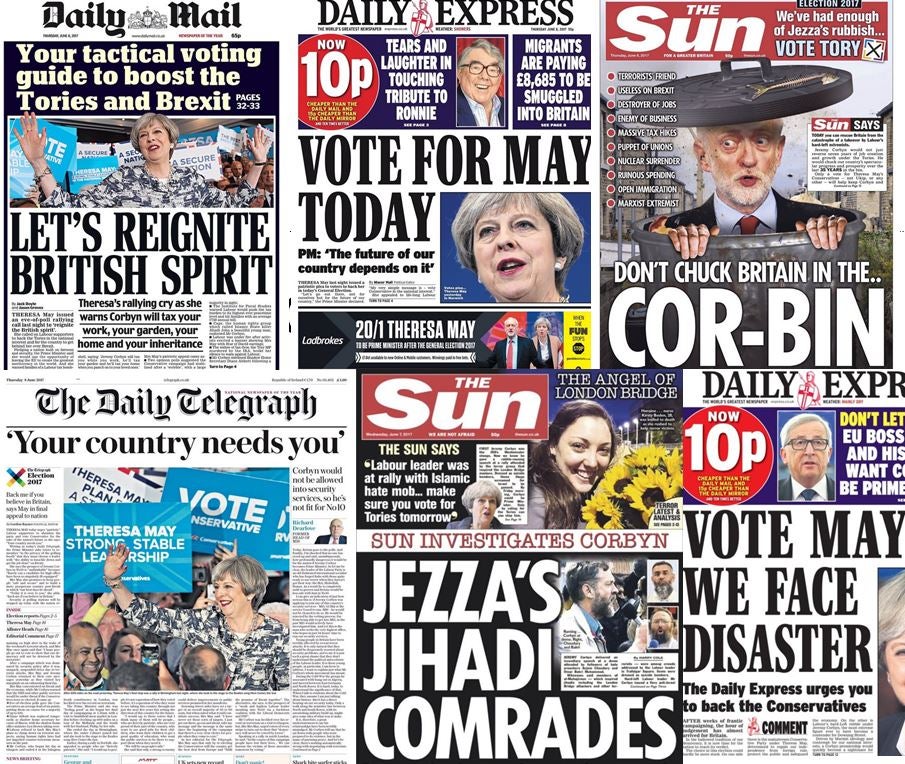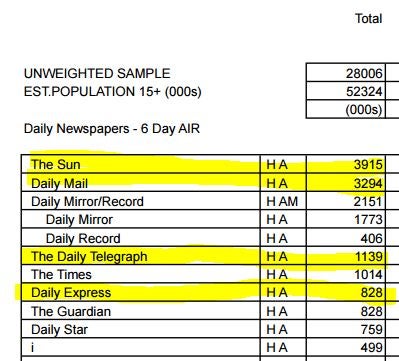
Some Labour supporters were so incensed by partisan Sun and Daily Mail election day front pages that they were moved to buy them in bulk and throw them in the bin.
Looking at a newsstand it seemed like the dice were hopelessly loaded against Labour when it comes to the newspaper industry.
The UK’s two highest selling daily newspapers (The Sun and Daily Mail) have used their front pages for a second day to make the case for a Conservative victory. Add the equally pro-Tory Daily Telegraph and Daily Express to that mix and it appears to be a potent force.
Some will ask how Labour can ever win a general election in the face of such a determinedly hostile Tory press.
But I would question whether Fleet Street support is as influential when it comes to determining general elections as some think.
Here are the weekly readerships across six days (according to the National Readership survey) of the four leading pro-Tory titles:
- The Sun: 3.9m
- Daily Mail: 3.3m
- Daily Telegraph: 1.1m
- Daily Express 0.8m

That makes a total readership of 9.1m out of 47m eligible voters.
Now we need to subtract around 400,000 from that total for the Scottish Sun, which is pro SNP and we are left with 8.7m.
We should also subtract the readership of the pro-Labour daily national newspaper titles to get a truer idea of the Tories’ net national press advantage. They are:
- Daily Mirror: 1.8m
- The Guardian: 0.8m
- Daily Record: 0.4m.
When that 3m total is taken away, we are left with a net advantage to the Tories of 5.7m potentially brainwashed newspaper readers.
Assuming election turnout among these readers is at the 2015 overall level of 66 per cent brings the total down to 3.8m.
In 2015, the Daily Mail, Sun and Telegraph were at least as stridently pro-Tory as they were in this election campaign (probably more so because there wasn’t the distraction of two major terrorist attacks). The Express endorsed UKIP in 2015.
YouGov data from the 2015 general election found that some 47 per cent of Sun readers voted Conservative versus 37 per cent nationally. Daily Mail readers were 59 per cent Tory and Telegraph readers were said to be 69 per cent Conservative.
So on average, Tory support among these titles was around 20 percentage points higher than the general population (albeit with high much higher levels of UKIP support then than now).
Based on current readership figures, such an uplift would deliver the Conservatives an extra 760,000 votes (20 per cent of the net 3.8m voters press advantage the Tories have).
But that is making the huge assumption that biased editorial coverage is the only factor in explaining why Sun, Express, Mail and Telegraph readers are more likely to vote Conservative).
To a large extent these titles preach to the choir, reflecting the concerns of readers. The Daily Mail and Telegraph in particular are bought by better-off, older, middle class readers who are naturally far more likely to vote Conservative anyway.
Some readers presumably choose right-wing newspapers because they agree with the political views of those titles.
In the 2015 general election the Conservatives polled 11.3m versus Labour on 9.3m.
If Labour loses tomorrow, unless the margin of defeat is considerably smaller than that, I would argue that Corbyn’s team will have to look beyond Fleet Street for reasons to explain it.
It also worth remembering that all the evidence suggests people have been far more likely to share pro-Labour news stories on social media in this election. Although this may be balanced by the Tories outgunning Labour with a particularly aggressive Facebook advertising campaign.
Most research suggests that TV is by far the most influential medium when it comes to political news and (as required by law) its coverage of the campaign has been balanced and impartial.
Finally, those incensed by today’s Sun front page should perhaps ask themselves if it has made them any less inclined to vote Labour? And if not, why don’t they credit others with the same independence of thought?
Note: The Times and FT endorsed the Tories but have been pretty even-handed in their election coverage. Metro, i and the Daily Star are all politically neutral.
Email pged@pressgazette.co.uk to point out mistakes, provide story tips or send in a letter for publication on our "Letters Page" blog
